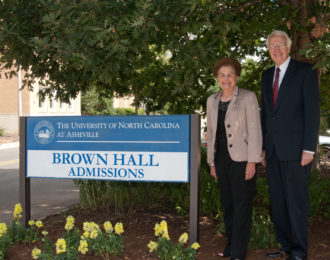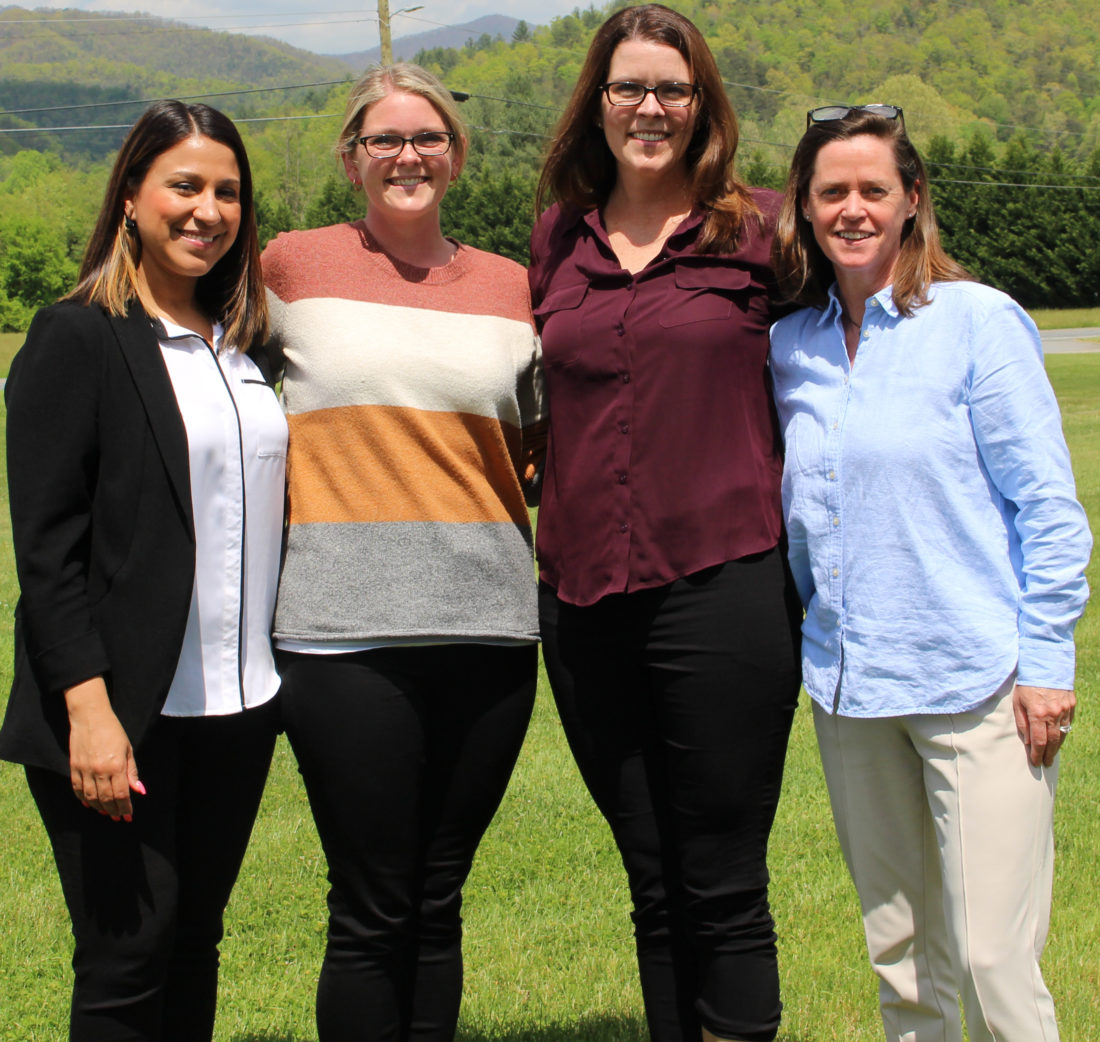When Dave and Lin Brown retired to Asheville in 2004, they knew they wanted to become involved in philanthropy. But they weren’t quite sure how to go about it.
Although the couple had accumulated some investments over their respective careers — Dave as a former chancellor of UNC Asheville and provost of Wake Forest University, Lin as a community leader and founder of the College for Seniors at what is now UNCA’s Osher Lifelong Learning Institute — they knew they wanted to add to those funds over time. And they hadn’t yet settled on a specific focus for their giving.
Their solution was establishing a donor-advised fund at the Community Foundation of Western North Carolina. The foundation manages over 430 such funds, which give donors the flexibility to choose the causes they support in any given year. In 2021 alone, those donors gave nearly $10.9 million to more than 1,100 nonprofits across 18 WNC counties and the Qualla Boundary.
“By having a donor-advised fund, we could in a sense kick the can down the road,” explains Dave Brown. “A donor-advised fund gave us the flexibility to wait and see how we wanted those funds used.”

The Browns eventually settled on using their money to start a free lecture series that invites the entire Asheville community to hear visionary speakers at UNCA. “When we were at Wake Forest, we realized the impact that a nationally prominent speaker could have,” Dave says. “We also realized that if UNCA allocated its full guest speaker budget, it could barely afford one of these speakers in a given year.”
Their example speaks to the CFWNC’s singular role in the region’s philanthropic life. Unlike most nonprofits, which focus on specific issues such as health care or protecting the environment, the foundation is dedicated to helping area donors and other nonprofits support their own distinctive causes.
Community coffer
The CFWNC was founded in 1978 as the Community Foundation of Greater Asheville. Community leaders modeled the organization after The Cleveland Foundation, a group started in Ohio in 1914, which aimed to build a centralized pool of financial resources for local charities to make a greater collective impact.
The community foundation idea has since spread to 750 places in the United States, according to philanthropy education group Learning to Give, with at least one in every state. Foundations range in size from comparatively small organizations with less than $1 million under management to giants like California’s Silicon Valley Community Foundation with $13.5 billion.
When Asheville’s own community foundation started, it had about $300,000 in assets. By 1990, that endowment had grown to over $5 million, and before the Great Recession of 2007, it held $150 million.
Elizabeth Brazas, the CFWNC’s president and CEO, joined the foundation in 2009, just as the recession had taken a $25 million bite out of its assets. Under her leadership, the endowment subsequently climbed to $425 million at the end of March, making CFWNC the third-largest community foundation in North Carolina. (The organization ranked 77th among the nation’s community foundations in a recent survey by nonprofit industry website Candid.org.)
Both the Charlotte-based Foundation for the Carolinas and The Winston-Salem Foundation have bigger endowments than CFWNC, with the former’s assets approximately $3.6 billion, and are larger on a per-capita basis as well. But as CFWNC spokesperson Lindsay Hearn points out, those comparisons may not capture the foundation’s relative importance to the area.
“Each community foundation is individual, meaning that we don’t all serve the same size or composition of region,” she says. “CFWNC’s service area of 18 counties is about the size of Vermont. Our service area is largely rural. We don’t have the big corporations of places like Charlotte or Atlanta.”
Best-laid plans
Today, Brazas oversees a staff of 18 and works with a board of 19 community leaders. The CFWNC focuses on four areas, as established through a strategic planning process in 2011: food and farming, natural and cultural resources, early childhood development and human services.
That plan had been revisited once in 2016, Brazas says, and the nonprofit had been preparing for another refresh in early 2020. Work quickly shifted gears, however, with the arrival of the COVID-19 pandemic.
While most nonprofits must stay focused on their specific cause, suggests Morganton-based board member Caroline Avery, the CFWNC’s adaptable structure helps it pivot quickly to meet new challenges, such as the pandemic or the flooding caused by Tropical Storm Fred in 2021. “The community foundation is a charitable Gumby,” she says.
“I think Caroline means that we’re flexible and nimble,” Brazas explains. “And we have proven that recently with the way we operated during COVID before federal and state grants were flowing.”
As the pandemic was hitting and schools were shutting down, Brazas and her team were on the phone with other local foundations, corporations and individuals, asking them to contribute to an Emergency and Disaster Relief Fund that CFWNC had created in 2019. They tapped other existing CFWNC endowments, including regional affiliates in Haywood, McDowell, Mitchell, Rutherford, Transylvania and Yancey counties. And they asked the holders of donor-advised funds to direct some of their giving to the pandemic initiative.
CFWNC then reached out to nonprofits that were helping people affected by COVID-19 and invited them to apply for grants. “The Community Foundation not only had the ability to create that fund, but we had the ability to create a very streamlined grant process that wasn’t burdensome for people to apply to,” Brazas says.
Within a speedy nine weeks, from the end of March through May 2020, the Emergency and Disaster Relief Fund distributed $1.3 million to 156 groups helping homeless people, children, the elderly, families in crisis, people with health problems and those needing food assistance. By March 2021, nearly $2.5 million had gone out to support pandemic-related projects throughout the region.
Bountiful giving
Among the nonprofits that has benefited from CFWNC’s pandemic support is Bounty & Soul, a Black Mountain organization that provides nutritious food, mostly fruits and vegetables, to people with food insecurity in the Swannanoa Valley. The group received $10,000 through the Emergency and Disaster Relief Fund, plus an additional $5,000 in 2021, to meet soaring demand for its services.
Ali Casparian started the nonprofit in 2014 after moving to Black Mountain a few years earlier. The inspiration came, she says, from personal experience.
“I was living from paycheck to paycheck with food insecurity when I first moved into the area,” Casparian explains. “I saw people just like me who were struggling and I thought, with all the robust agriculture here, no one should go hungry.”
While Bounty & Soul had received help from CFWNC before — its very first grant came from the foundation’s Black Mountain-Swannanoa Valley Endowment Fund to buy equipment for cooking demos and classes at its free weekly produce markets — the pandemic brought a new level of need.
“When COVID landed, we exploded,” Casparian explains. “We were typically seeing around 200 families at the churches and the school. Now we were up to 400 families. We could not serve that many people in the spaces we had.”
For the pandemic, the organization moved to a drive-thru model in a parking lot owned by Bi-Lo. “We had people lined up in cars up to the interstate,” Casparian says. Money from CFWNC helped ensure Bounty & Soul had enough food to support that demand.
Since then, CFWNC has contributed to further milestones in the nonprofit’s development. Casparian notes that Bounty & Soul acquired its first refrigerated truck with foundation support, and it recently expanded the Green Apron Club, a program for children as young as 3 to learn about cooking, gardening, health and nutrition.
Avery, the CFWNC’s Morganton board member, admires the way the foundation matches the interests of its donors with the needs of nonprofits. “It’s a beautiful ballet,” she says. “They know their donors very well, they know their nonprofits very well, and when they have a grant request come in, they know who might want to support it. They are savvy enough to connect those donors with a project that would be part of their heart.”



Before you comment
The comments section is here to provide a platform for civil dialogue on the issues we face together as a local community. Xpress is committed to offering this platform for all voices, but when the tone of the discussion gets nasty or strays off topic, we believe many people choose not to participate. Xpress editors are determined to moderate comments to ensure a constructive interchange is maintained. All comments judged not to be in keeping with the spirit of civil discourse will be removed and repeat violators will be banned. See here for our terms of service. Thank you for being part of this effort to promote respectful discussion.